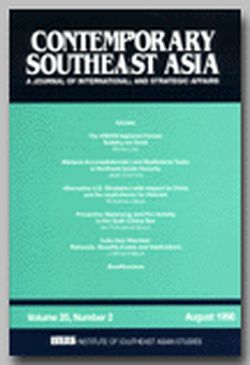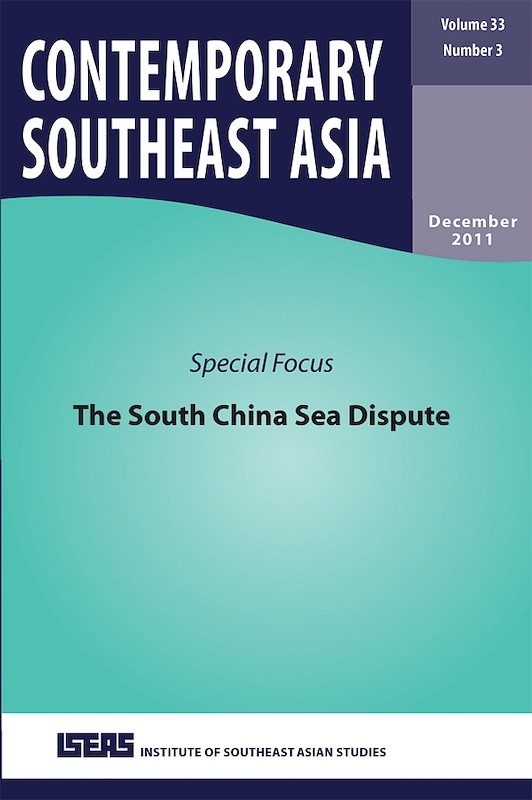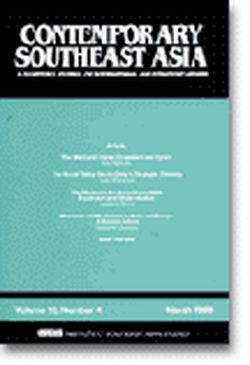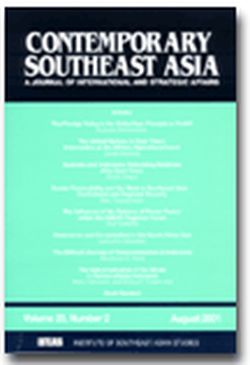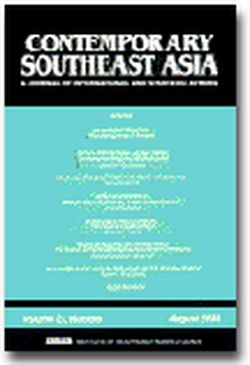Contemporary Southeast Asia: A Journal of International and Strategic Affairs Vol. 21/1 (Apr 1999)
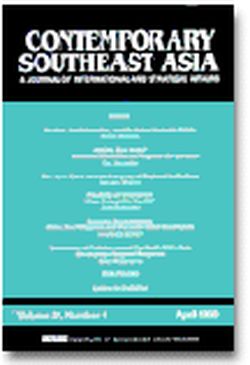
Date of publication:
April 1999
Number of pages:
156
Code:
CS21/1
Contents
-
Preliminary Pages
-
Realism, Institutionalism, and the Asian Economic Crisis, by Amitav Acharya, contributor see abstractThe Asian economic crisis has brought into sharp focus competing visions of Asian regional order put forward by Realism and Institutionalism. In the early 1990s, Institutionalism challenged the traditional dominance of the Realist paradigm in the region. Now, it has been put on the defensive. The Asian crisis has rekindled inter-state disputes, reduced the credibility of multilateral bodies such as ASEAN, APEC and the ARF, and may be reshaping perceptions of the regional balance of power. It has underscored the relative salience of great power leadership vis-Ã -vis small power-led co-operative ventures. But this article sees the Asian crisis as a double-edged sword. While raising doubts about Institutionalism, it does not enhance the credibility of Realist prescriptions for regional order based on balance of power frameworks. Rather, a plethora of developments has opened up new possibilities for an Institutionalist reordering of the Asia-Pacific region.
-
ASEAN, Quo Vadis? Domestic Coalitions and Regional Co-operation, by Etel Solingen, contributor see abstractThis article advances a coalitional approach to understanding ASEAN co-operation as a product of the domestic political forces that conceived and nurtured it. Pivotal leaders throughout the region forged supportive internationalist coalitions at home that favoured domestic and regional political and economic stability and global access. This strategy demanded accommodation and co-optation of backlash states in the region, in an effort to protect the implementation of internationalist agendas across the domestic, regional, and global spheres. Accordingly, ASEANâs military expenditures were characterized by moderation, defensiveness, and transparency to avoid choking the domestic macroeconomic requirements of an internationalist strategy. The post-1997 regional crisis provides a test of both ASEANâs co-operation and a coalitional interpretation as its driving force.
-
The Asian Crisis and the Adequacy of Regional Institutions, by Michael Wesley, contributor see abstractLittle attention has been given to the role of regional institutions during the East Asian financial crisis. This article assesses the major responses of ASEAN, APEC and the ADB to the crisis, concluding that the minimalist actions of regional institutions have had little effect on mitigating the economic downturn or promoting recovery. It argues that despite much attention being given to national-level and global level reforms, more effective region-level structures need to be constructed against future financial turmoil. Problems remain for East Asia in assembling such regional institutions, but perhaps recent proposals for the reform of ASEAN by younger East Asian leaders point the way to the future.
-
Flexibility or Irrelevance: Ways Forward for the ARF, by John Garofano, contributor see abstractMeasured by its own standards of progress on security dialogues, the ARF has made impressive strides since its formation in 1994. Security challenges in the coming decade are, however, likely to cripple the ARF if it adheres to its current modus operandi of seeking general unanimity and consensus. Since approaches based on the European paradigm are both unacceptable and in most cases inappropriate to the Asia-Pacific environment, and the ARF approach may not lead to meaningful adjustment of member statesâ self-interests and fears, different steps must be taken. Goals must be made more concrete and multilateralism must assume a practicable scope â in short, a more pragmatic and outcomes-based vision is needed. Conventional arms acquisitions and the competing claims on the Spratly Islands are two good issues on which to start.
-
Creeping Assertiveness: China, the Philippines and the South China Sea Dispute, by Ian Storey, author see abstractThis article examines the development of Sino-Philippine territorial disputes in the South China Sea during 1995â98. Chinaâs occupation of Mischief Reef in 1995 was part of a dual strategy of negotiation and occupation, influenced by domestic political factors. The weakness of the Philippine armed forces provided the Peopleâs Republic of China with an opportunity to extend its claims in the South China Sea, avoiding the possibility of military confrontation. The Philippines has pursued diplomacy to resolve the disputes, employing both bilateral and multilateral negotiations. Whilst these negotiations have met with some success, the primary issues remain unresolved. In its dispute with the PRC, the Philippines received unprecedented support from ASEAN, which viewed Chinaâs actions as damaging to regional stability. The United States provided very limited support to the Philippines as its vital national interests were not affected.
-
Environmental Pollution around the South China Sea: Developing a Regional Response, by David Rosenberg, contributor see abstractThe South China Sea â the busiest shipping lane and surrounded by some of the most rapidly industrializing countries in the world â is becoming a sink for regional environmental pollution. Countries bordering the South China Sea have usually been more concerned with maximizing national economic growth and ensuring adequate energy supplies than in preserving their regional maritime environment. They have staked often conflicting territorial claims to areas with potential oil and natural gas reserves. While a territorial settlement is unlikely in the short term, other avenues of regional co-operation have emerged, in particular, the ASEAN effort to curb smoke haze. This article examines the phenomenon of smoke haze, its short-term and long-term causes and consequences, and the institutional responses to it.
- BOOK REVIEWS
-
BOOK REVIEW: Vietnam: Anatomy of Peace, by Gabriel Kolko, by Ramses Amer, contributor
-
BOOK REVIEW: Southeast Asia: The Human Landscape of Modernization and Development, by Jonathan Rigg
-
BOOK REVIEW: Regional Maritime Management and Security, edited by Sam Bateman and Stephen Bates, by Jayabalan Vijayakumar, contributor
-
Letters to the Editor: Oil and the Lack of It in the South China Sea, by Mark J. Valencia and Jon M. Van Dyke; Response by Ian Townsend-Gault

